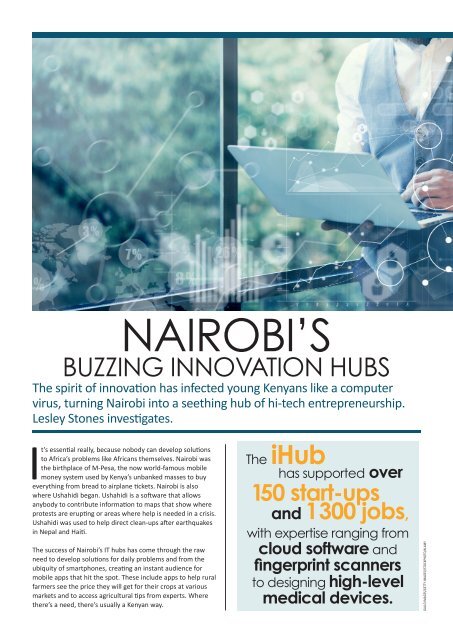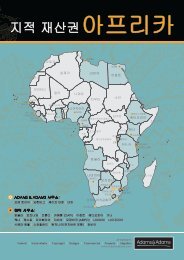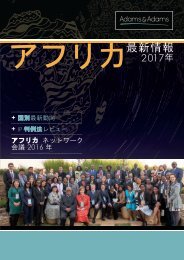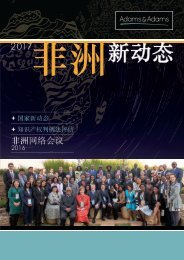Adams on Africa | Issue 2
Issue 2 of the Adams on Africa Newsletter by Adams & Adams Attorneys - with a focus on legislation, intellectual property, business and commercial news in Africa, especially in East Africa.
Issue 2 of the Adams on Africa Newsletter by Adams & Adams Attorneys - with a focus on legislation, intellectual property, business and commercial news in Africa, especially in East Africa.
Create successful ePaper yourself
Turn your PDF publications into a flip-book with our unique Google optimized e-Paper software.
The Nairobi Garage runs two hubs that provide working<br />
spaces in an entrepreneurial atmosphere. Its newest<br />
branch will host around 70 companies, bringing its total<br />
membership to 100 start-ups. “What you get with the<br />
Garage is a ready-made and very active community of<br />
innovators, looking to learn with and help <strong>on</strong>e another,”<br />
says General Manager Hannah Clifford. It also makes it<br />
easy for foreign investors who want to get a foothold in<br />
<strong>Africa</strong> to back these local innovators.<br />
The hubs give entrepreneurs a workspace with Internet<br />
access, business mentoring and networking opportunities,<br />
often helping them find financial backing to develop their<br />
ideas and see if they fly.<br />
Nairobi’s Strathmore University, for example, hosts the iLab<br />
and iBiz incubator centres, and provides access to databases,<br />
informati<strong>on</strong> systems, archives, <strong>on</strong>line collaborati<strong>on</strong><br />
and interactive learning facilities used by all of Kenya’s<br />
universities. Another prominent player is m:Lab East <strong>Africa</strong>,<br />
supported by the World Bank, the University of Nairobi,<br />
the World Wide Web Foundati<strong>on</strong>, the iHub and private<br />
firm eMobilis. The m:Lab has spawned many start-ups<br />
through its annual Pivot East competiti<strong>on</strong>, which encourages<br />
entrepreneurs to formalise their visi<strong>on</strong> and compete for the<br />
seed funding and business coaching offered to five winners<br />
every year.<br />
Nairobi’s<br />
buzzing innovati<strong>on</strong> hubs<br />
The spirit of innovati<strong>on</strong> has infected young Kenyans like a computer<br />
virus, turning Nairobi into a seething hub of hi-tech entrepreneurship.<br />
Lesley St<strong>on</strong>es investigates.<br />
It’s essential really, because nobody can develop soluti<strong>on</strong>s<br />
to <strong>Africa</strong>’s problems like <strong>Africa</strong>ns themselves. Nairobi was<br />
the birthplace of M-Pesa, the now world-famous mobile<br />
m<strong>on</strong>ey system used by Kenya’s unbanked masses to buy<br />
everything from bread to airplane tickets. Nairobi is also<br />
where Ushahidi began. Ushahidi is a software that allows<br />
anybody to c<strong>on</strong>tribute informati<strong>on</strong> to maps that show where<br />
protests are erupting or areas where help is needed in a crisis.<br />
Ushahidi was used to help direct clean-ups after earthquakes<br />
in Nepal and Haiti.<br />
The success of Nairobi’s IT hubs has come through the raw<br />
need to develop soluti<strong>on</strong>s for daily problems and from the<br />
ubiquity of smartph<strong>on</strong>es, creating an instant audience for<br />
mobile apps that hit the spot. These include apps to help rural<br />
farmers see the price they will get for their crops at various<br />
markets and to access agricultural tips from experts. Where<br />
there’s a need, there’s usually a Kenyan way.<br />
The iHub<br />
has supported over<br />
150 start-ups<br />
and 1300 jobs,<br />
with expertise ranging from<br />
cloud software and<br />
fingerprint scanners<br />
to designing high-level<br />
medical devices.<br />
Gallo Images/Getty Images/Istockphoto/Alamy<br />
Where there’s a need, there’s<br />
“usually a Kenyan way.<br />
Kenyan-born Erik Hersman has been crucial in bringing<br />
together entrepreneurs, designers and the investment<br />
community to run organisati<strong>on</strong>s like the iHub, <strong>on</strong>e of <strong>Africa</strong>’s<br />
most successful IT innovati<strong>on</strong> hubs. Google, Microsoft and Intel<br />
are am<strong>on</strong>g its backers, keeping them close to innovative ideas<br />
and promising young employees.<br />
For every success, there are many failures, of course.<br />
“Kenya promoted itself successfully as ‘Silic<strong>on</strong> Savannah’<br />
and has to some extent been a victim of its own selfpublicity,”<br />
says Russell Southwood, CEO of Balancing Act, a<br />
telecoms, Internet and media c<strong>on</strong>sultancy. “In terms of startups<br />
over the last five years, Kenya has g<strong>on</strong>e through the hype<br />
curve and come out the other side. Many of the current startups<br />
are wiser and more knowledgeable, but scaling up remains<br />
a challenge.”<br />
Many entrepreneurs launched their companies fresh from<br />
college, believing their coding and IT expertise would<br />
guarantee success. But often they lacked the necessary<br />
c<strong>on</strong>tacts and business skills to c<strong>on</strong>nect with the market.<br />
Kenya’s tech hubs c<strong>on</strong>centrated <strong>on</strong> these youngsters, whereas<br />
in more developed markets, successful entrepreneurs usually<br />
have more industry experience, Southwood says. However, the<br />
number of incubators c<strong>on</strong>tinues to grow, and Kenya now has<br />
about 27.<br />
“<br />
A paper for the World Development Report 2016 assessed<br />
<strong>Africa</strong>’s tech hubs to see why they have a high failure rate<br />
and what makes for success. It studied 11 hubs in Kenya<br />
and found they were all run by civil society or academic<br />
instituti<strong>on</strong>s, with n<strong>on</strong>e led by the government. The report<br />
said Nairobi’s tech space prides itself <strong>on</strong> thriving in spite<br />
of – rather than thanks to – the government. Even the<br />
government plan to set up a smart city has stalled, while<br />
private sector efforts have flourished, often supported by<br />
established enterprises keen to extend the talent pool.<br />
The best thing the government could do to increase the<br />
chance of success, the report suggests, is lower the cost of<br />
doing business with tax breaks; easier processes to create<br />
a company; easier access to finance; and awarding work<br />
permits to skilled foreigners.<br />
The hubs give entrepreneurs<br />
a workspace with<br />
Internet access, business<br />
mentoring and networking<br />
opportunities, often helping<br />
them find financial backing<br />
to develop their ideas and<br />
see if they fly.







![Adams on Africa [Africa Update] Q3 2018](https://img.yumpu.com/61997083/1/184x260/adams-on-africa-africa-update-q3-2018.jpg?quality=85)










